Blood Wedding
Oklahoma! at Bard SummerScape
Corn and guns—these two American icons dominate the setting as the audience enters the plywood interior that houses director Daniel Fish’s astonishing production of Rodgers and Hammerstein’s Oklahoma! The abundance of corn on the table and firearms on the wall is just the first of many moments in which the 2015 audience at Bard’s Richard B. Fisher Center recognizes the state of today’s union in the 1906 Oklahoma territory of Rodgers and Hammerstein’s great American musical. By reimagining the conventions of the genre, Fish and his collaborators have turned this familiar Western fable into a communal rite of passage. This Oklahoma! brings its audience face-to-face with the brutality and lawlessness that have been (and continue to be) foundations of our national character.
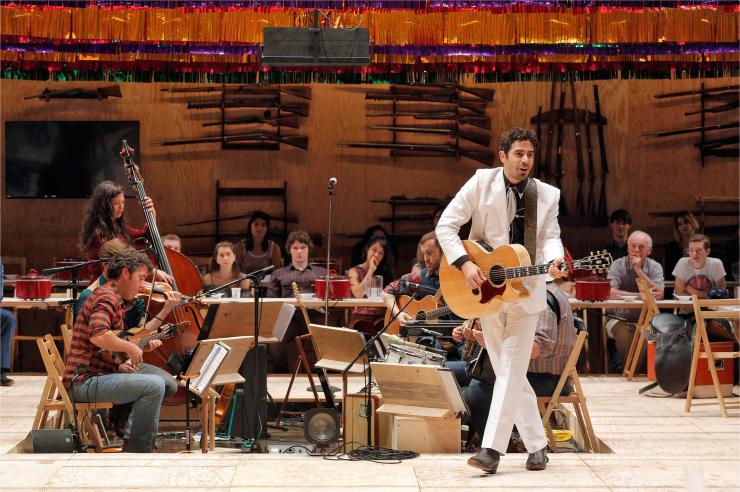
But, to paraphrase Brecht, first comes the fun, then comes the moral, and Fish’s Oklahoma! is nothing if not a roaring good time. The devilishly handsome Curly (Damon Daunno) seduces the audience as soon as he struts on stage with his guitar, strikes the opening chords, and starts crooning “Oh, What a Beautiful Mornin’.” The rest of the talented company follows suit, with folksy humor and hijinks piling on top of one another. A melodrama at its core, Oklahoma! centers on two love triangles, one elevated by heart, one grounded in lust. The charming Curly and the innocent Laurey (Amber Gray) must overcome the unwanted pursuit of Jud Fry (Patrick Vaill), an ostracized farmhand. Rodeo extraordinaire Will Parker (James Patrick Davis) must outwit the Persian peddler Ali Hakim (Benj Mirman) for the affections of the concupiscent Ado Annie (Allison Strong). Fish and the company have mined the musical for intimacy and stakes, and have dug up entertainment and intrigue in spades. Ali Hakam’s escapades to get into Ado Annie’s pants and, subsequently, out of the range of her father’s shotgun are hilariously sabotaged by Will Parker’s miscalculations. Curly and Laurey’s duet, “People Will Say We’re in Love,” is heart-melting, aided by some playful business with a microphone and Daunno’s gorgeous sotto voce.
Fish’s innovative riff on Rodgers and Hammerstein’s popular creation makes the company’s performances all the more enthralling. One character wears a trucker hat that says “Hybrid Seeds,” and one way to think of this production is that it’s a genetic recombination of classic Oklahoma! trappings and contemporary, folk-inflected style. Men in riding chaps and Western shirts take swigs from Bud Light cans. Curly twirls both electric guitars and an old-fashioned Colt revolver. Laurey’s modest dresses have turn-of-the-century silhouettes while Ado Annie wears revealing denim cut-offs and a sleeveless button-up. The flavor of this production, however, is more farmers market than GMO. There is a handcrafted quality to the plywood floors, the crock-pots of chili (which are served with pitchers of lemonade and cornbread during intermission), and the shiny, colorful streamers that hang in rows above the in-the-round configuration.
The flavor of this production, however, is more farmers market than GMO.
Nowhere is this production’s recombined genome more palpably felt than through Daniel Kluger’s new musical arrangements. Played onstage by a fabulous six-person band, the music refreshes Rodgers and Hammerstein’s familiar songs by digging into their folk roots and adding some rock ‘n’ roll flair. The earthy tones of a pedal steel guitar, accordion, and banjo have replaced the more orchestral brass and woodwinds in the original. The sound is more Mumford & Sons than New York Philharmonic. Somehow, the new arrangements make the melodies even more infectious. Throughout the production, audience members tap their toes, nod their heads, and slyly mouth the lyrics. During the title number, I witnessed one man either full on singing along or lip-synching in a manner best described as vigorous. Aided by the close proximity of the audience, the music plays a major role in creating the remarkable intimacy of the production, particularly in solo numbers, such as Amber Gray’s enchanting a cappella rendition of “Out of My Dreams.” Even in the bawdy numbers, such as Allison Strong’s hysterical confession “I Cain’t Say No!,” the actors’ presence is electrifying.
Eventually, the bright golden haze on the meadow shines light on some unsavory scenes. No different from today, money (or lack thereof) casts its sinister shadow. Women are not so much wooed as bought. Whether Will Parker and Ado Annie enter into matrimony depends a little on her feelings (and whether or not she agrees to abate her sexuality) and a lot on whether he can show her father fifty dollars in cash. The box social, putatively a fundraiser for a new schoolhouse, quickly devolves into a bidding war between Curly and Jud for Laurey. That Curly wins by selling off everything he owns; including his most valuable possession—his gun—does little to dispel the tension between the charismatic cowherd and the outcast hired hand.
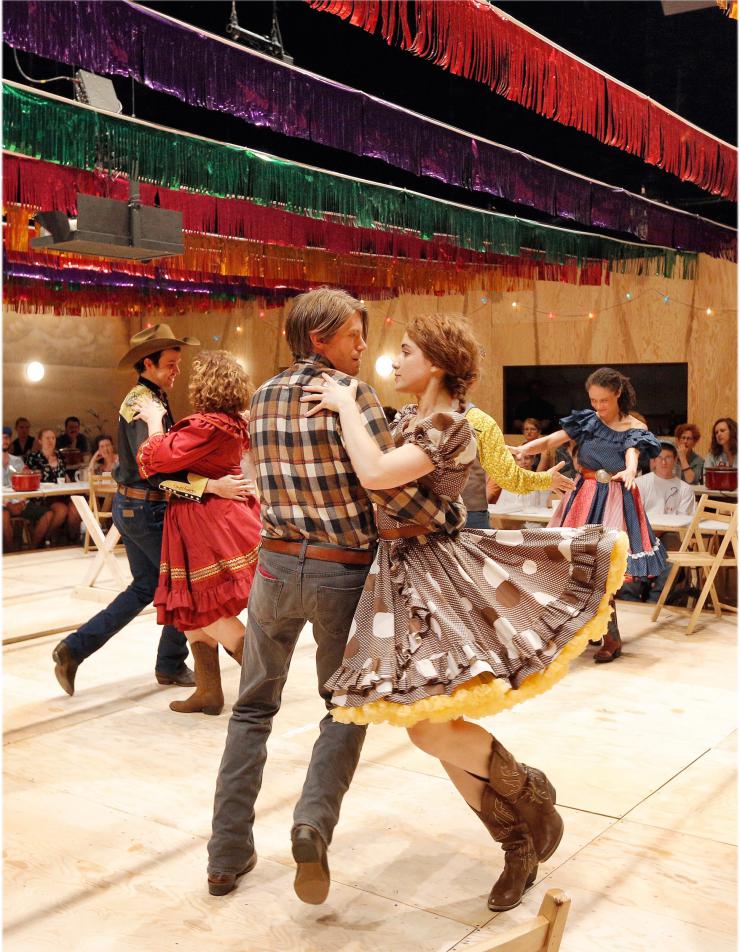
Earlier in the production, as that first beautiful morning gives way to night, Curly heads over to Jud’s smokehouse, and Fish plunges the audience into the musical’s dark side—literally. Curly and Jud sit and talk in complete darkness before a live video feed comes up as Curly sings “Pore Jud Is Daid.” Their faces are about a foot away from each other. Gunshots fired by both sides send shockwaves through the house. The scene grows complexly hostile and mildly erotic. In all its strangeness, one thing is clear—Jud threatens the union of our hero and his beloved, and he must be overcome. But how?
Since Curly and Laurey’s marriage so clearly parallels Oklahoma’s imminent admission into the union, Fish stages the final moments as a grim allegory of the price we pay for the pursuit of happiness. To set the scene, Curly, now a domesticated farmer, leads the rousing anthem of “Oklahoma!” as he and Laurey proceed to the altar. When Jud arrives to give the newlyweds a gift, Curly opens the box, finds a gun, and shoots Jud right through the heart. Blood jets, running down Jud’s front and splattering Curly and Laurey. Jud staggers to the ground. The men all debate how to help him—their voices eerily calm—but no one moves. Suggestions that Curly turn himself in are met with rebukes; it’s his wedding night, after all. Bypassing decorum, Carnes (Mitch Tebo) agrees to serve as judge for an impromptu hearing. Cord Elam (John Carlin) occasionally interrupts the proceedings to protest that the mock trial is against the law. “Feel funny about it,” he says, head hung in distress. Laurey, her journey from innocence to experience now complete, barely restrains the tears that fall on her bloodstained wedding dress.
Despite its legendary songs, no moment in the production is more familiar than the image of a man shot down for wanting what he can’t have. As the chilling scene unfolds, a painful truth sets in: we know how this story ends.
The scene hits home. Despite its legendary songs, no moment in the production is more familiar than the image of a man shot down for wanting what he can’t have. As the chilling scene unfolds, a painful truth sets in: we know how this story ends. The verdict of not guilty is a formality. The show ends with a reprise of “Oklahoma!,” but this time it’s different. The joyous anthem has acquired an unnerving undercurrent. The chorus sounds almost forced, as if each person is suppressing a question mark at end of phrases, such as “You’re doing fine, Oklahoma.” Several look at the floor, away from Jud’s dead body. The gestus packs a punch.
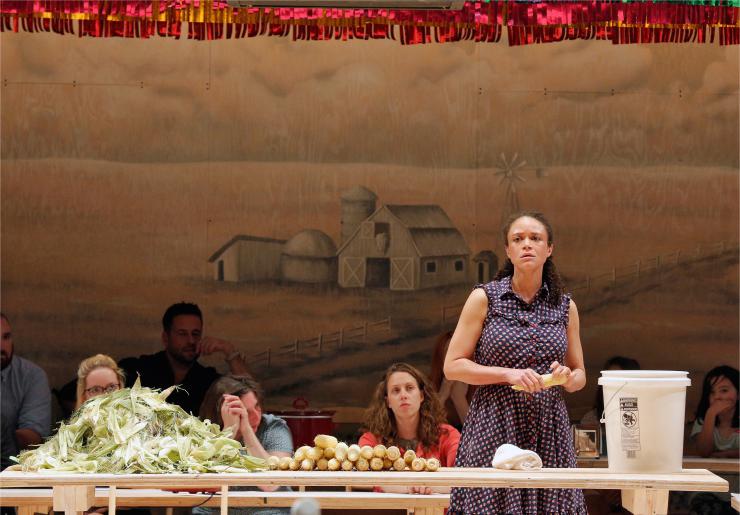
The mythic undertones of the final tableau only enhance the production’s topicality. At least as far back as Osiris, communities have made bloody sacrifices to corn-deities. Jud is just one of many victims killed to appease the American god of progress. When Oklahoma! first premiered in 1943, Agnes de Mille, the original choreographer, explained that “somehow within this show is the essence of America.” Back then, there was less doubt about what the phrase, “we belong to the land” really meant. Seven decades later, Fish proves that de Mille was right. Sadly, today, Cord Elam’s funny feeling is the closest thing we have to a national mood.


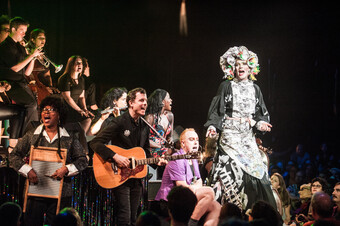

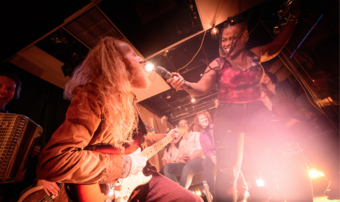

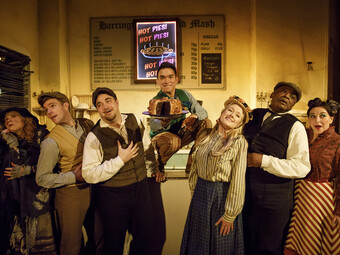

Comments
The article is just the start of the conversation—we want to know what you think about this subject, too! HowlRound is a space for knowledge-sharing, and we welcome spirited, thoughtful, and on-topic dialogue. Find our full comments policy here